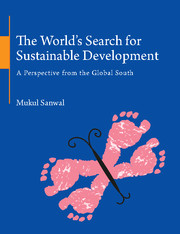Book contents
- Frontmatter
- Dedication
- Contents
- Preface
- Acknowledgments
- Abbreviations
- INTRODUCTION
- 1 Social Dimension of Sustainability
- CONSUMPTION IN AN UNEQUAL WORLD: FRAMING INTERNATIONAL COOPERATION
- CLIMATE POLICY: GLOBAL TO NATIONAL
- SUSTAINABLE DEVELOPMENT: NATIONAL TO GLOBAL
- CONSUMPTION IN A MORE EQUAL WORLD: SHAPING SOCIETAL FUNCTIONS
- 17 Geoeconomics of Human Well-being
- 18 Social Science – Policy – Society Interface
- 19 Reframing the ‘Common Concern’ From a Physical to a Social Problem
- 20 Developing a Shared Global Vision
- GEOPOLITICS TO GEOECONOMICS: RURAL–URBAN DIVIDE, RATHER THAN BETWEEN COUNTRIES
- THE ASIAN CENTURY
- Index
20 - Developing a Shared Global Vision
from CONSUMPTION IN A MORE EQUAL WORLD: SHAPING SOCIETAL FUNCTIONS
Published online by Cambridge University Press: 18 December 2015
- Frontmatter
- Dedication
- Contents
- Preface
- Acknowledgments
- Abbreviations
- INTRODUCTION
- 1 Social Dimension of Sustainability
- CONSUMPTION IN AN UNEQUAL WORLD: FRAMING INTERNATIONAL COOPERATION
- CLIMATE POLICY: GLOBAL TO NATIONAL
- SUSTAINABLE DEVELOPMENT: NATIONAL TO GLOBAL
- CONSUMPTION IN A MORE EQUAL WORLD: SHAPING SOCIETAL FUNCTIONS
- 17 Geoeconomics of Human Well-being
- 18 Social Science – Policy – Society Interface
- 19 Reframing the ‘Common Concern’ From a Physical to a Social Problem
- 20 Developing a Shared Global Vision
- GEOPOLITICS TO GEOECONOMICS: RURAL–URBAN DIVIDE, RATHER THAN BETWEEN COUNTRIES
- THE ASIAN CENTURY
- Index
Summary
New role of the social sciences
Assessments of Rio+20, held in 2012, largely focus on institutional issues, for example, conference diplomacy, institutional redesign and multilateralism and this restricts the analysis to what was agreed by states. For example, researchers who have been reviewing the evolution of international law consider the agreement on developing global sustainable development goals as important, but within their treaty-based framework global goals are not considered a significant achievement with implications for the longer term future. Rio+20 should really be seen as a milestone in the evolution of sustainable development, since sustainability is about the use and distribution not scarcity of natural resources, it is highly political, and new thinking already emerging from within the United Nations, government think tanks and private sector consultancies reflects the emergence of a new kind of broad-based social, rather than natural, science ‘epistemic community’, their input gives hope for a successful transformation as the global middle class triples by 2050.
In 1972, states agreed that the global commons were a ‘common concern’ and needed consideration distinct from national economic development, which was causing environmental degradation. In 1992, the need for international cooperation was cemented through multilateral environmental agreements, for example, on climate change and biological diversity. Now, in 2012, states have agreed that global environmental concerns and national economic development should be encompassed within a common set of global goals for all countries, described in terms of sustainable development. The explanation of these shifts is provided by the ‘World Social Science Report, 2013’, produced by the United Nations Education, Social and Cultural Organization (UNESCO), prepared jointly with the International Council for Social Science Research (ICSSR) and the Organization for Economic Co-operation and Development (OECD) – a wide cross-section of opinion – which concludes that ‘the social sciences must help to fundamentally reframe climate and global environmental change from a physical into a social problem’.
Global sustainable development goals reflect this reframing. The scale of global change requires policy choices and trade-offs in the face of conflicting priorities, particularly with respect to three related but distinct global drivers – urbanization, energy, and the middle class – as they depend on natural resource use with a global impact.
- Type
- Chapter
- Information
- The World's Search for Sustainable DevelopmentA Perspective from the Global South, pp. 235 - 246Publisher: Cambridge University PressPrint publication year: 2015

